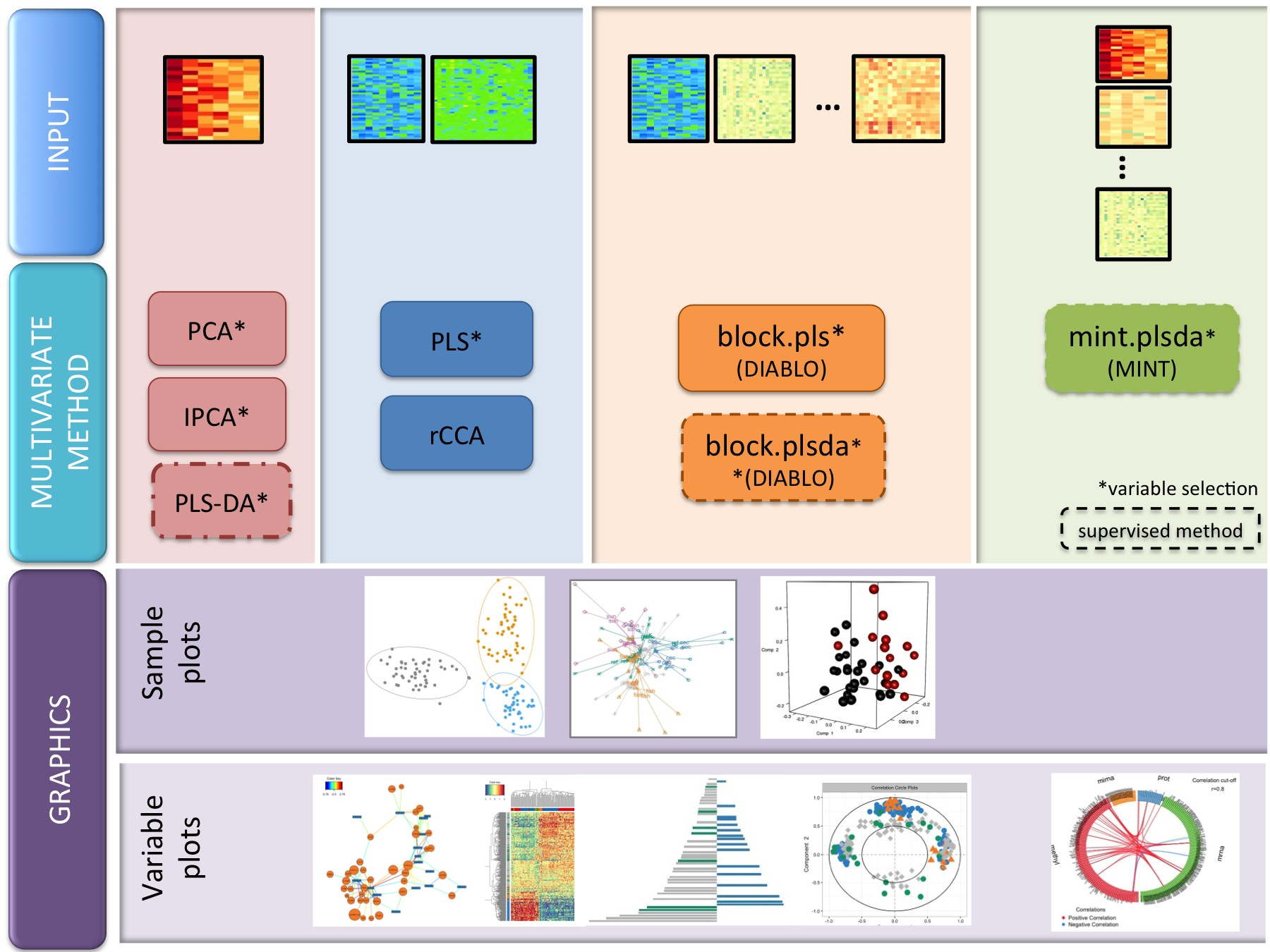mixOmicsTeam / Mixomics
Programming Languages
Projects that are alternatives of or similar to Mixomics
This repository contains the R package now hosted on
Bioconductor
and our current GitHub version.
Installation
(Mac OS Users Only:) Ensure you have installed XQuartz first.
Make sure you have the latest R version and the latest BiocManager
package installed following these
instructions (if you use legacy
R versions (<=3.5.0) refer to the instructions at the end of the
mentioned page).
## install BiocManager if not installed
if (!requireNamespace("BiocManager", quietly = TRUE))
install.packages("BiocManager")
## ensure the following returns TRUE, or follow guidelines
BiocManager::valid()
Latest Bioconductor Release
You can then install mixOmics using the following
code:
## install mixOmics
BiocManager::install('mixOmics')
GitHub Versions
Stable version
Install the latest stable version (see below for latest development version) of mixOmics from
GitHub (as bug-free as it can be):
BiocManager::install("mixOmicsTeam/mixOmics")
Check after installation that the following code does not throw any error (especially Mac users - refer to installation instructions) and that the welcome message confirms you have installed the latest version:
library(mixOmics)
#> Loaded mixOmics ?.?.?
Development version
You can also install the development version for new features yet to be widely tested (see What's New):
BiocManager::install("mixOmicsTeam/[email protected]")
Contribution
We welcome community contributions concordant with our code of
conduct.
We strongly recommend adhering to Bioconductor’s coding
guide for
software consistency if you wish to contribute to mixOmics R codes.
Bug reports and pull requests
To report a bug (or offer a solution for a bug!): https://github.com/mixOmicsTeam/mixOmics/issues. We fully welcome and appreciate well-formatted and detailed pull requests. Preferrably with tests on our datasets.
Discussion forum
We wish to make our discussions transparent so please direct your questions to our discussion forum https://mixomics-users.discourse.group. This forum is aimed to host discussions on choices of multivariate analyses, bug report as well as comments and suggestions to improve the package. We hope to create an active community of users, data analysts, developers and R programmers alike! Thank you!
About the mixOmics team
mixOmics is collaborative project between Australia (Melbourne),
France (Toulouse), and Canada (Vancouver). The core team includes
Kim-Anh Lê Cao - https://lecao-lab.science.unimelb.edu.au (University
of Melbourne), Florian Rohart - http://florian.rohart.free.fr
(Toulouse) and Sébastien Déjean -
https://perso.math.univ-toulouse.fr/dejean/. We also have key
contributors, past (Benoît Gautier, François Bartolo) and present (Al
Abadi, University of Melbourne) and several collaborators including
Amrit Singh (University of British Columbia), Olivier Chapleur (IRSTEA,
Paris), Antoine Bodein (Universite de Laval) - it could be you too, if
you wish to be involved!.
The project started at the Institut de Mathématiques de Toulouse in
France, and has been fully implemented in Australia, at the University
of Queensland, Brisbane (2009 – 2016) and at the University of
Melbourne, Australia (from 2017). We focus on the development of
computational and statistical methods for biological data integration
and their implementation in mixOmics.
Why this toolkit?
mixOmics offers a wide range of novel multivariate methods for the
exploration and integration of biological datasets with a particular
focus on variable selection. Single ‘omics analysis does not provide
enough information to give a deep understanding of a biological system,
but we can obtain a more holistic view of a system by combining multiple
‘omics analyses. Our mixOmics R package proposes a whole range of
multivariate methods that we developed and validated on many biological
studies to gain more insight into ‘omics biological studies.
Want to know more?
www.mixOmics.org (tutorials and resources)
Our latest bookdown vignette: https://mixomicsteam.github.io/Bookdown/.
Different types of methods
We have developed 17 novel multivariate methods (the package includes 19 methods in total). The names are full of acronyms, but are represented in this diagram. PLS stands for Projection to Latent Structures (also called Partial Least Squares, but not our prefered nomenclature), CCA for Canonical Correlation Analysis.
That’s it! Ready! Set! Go!
Thank you for using mixOmics!
What’s New
September 2020
- New biplot now available for
pcafamily. See the examples in this issue
April 2020
- weighted consensus plots for DIABLO objects now consider per-component weights
March 2020
-
plotIndivnow supports (weighted) consensus plots for block analyses. See the example in this issue -
plotIndiv(..., ind.names=FALSE)warning issue now fixed
January 2020
-
perf.block.splsdanow supports calculation of combined AUC -
block.splsdabug which could drop some classes withnear.zero.variance=TRUEnow fixed
November 2019
-
Parallel computing improved for
tuneandperffunctions, and even more on Unix-like systems -
Fixed margin error problem with
plotLoadings. See the example in this issue -
cimbug which overestimated correlations for single component now fixed -
perf.sgccdanow supports calculation of average combined AUC
September 2019
- You can now customise
aurocplots in version 6.8.3. See example here



-lightgrey.svg)

